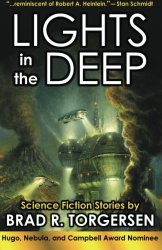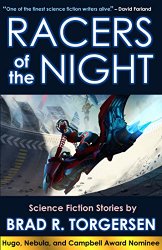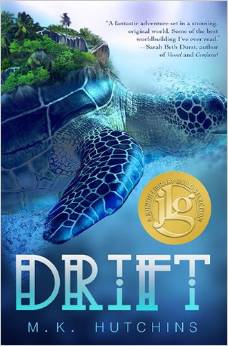
Lights in the Deep
by Brad R. Torgersen (Wordfire Press)
My first exposure to the works of Brad R. Torgersen was the story “Ray of Light” in the November 2011 Analog. Like David Levine’s “Tk’Tk’Tk’, “ I thought it was worthy of awards nominations as soon as it came out. I forgot the author’s name, over time, and then saw it was up for a Nebula for that story.
I requested a copy of the anthology it was in, for review. Brad sent along a copy of THE CHAPLAINS WAR, which is not a small press publication so I cannot review it here (but they should make it into a movie, really) and his other collection which I review below: RACERS OF THE NIGHT. Before I get into the individual stories, let me just mention that I love the little afterwords that Torgersen adds after each piece, giving us an insight into his creative process. They should be required reading for aspiring genre writers. And these gems are written in such an accessible style, like you’re hanging out with him at a con suite and having a friendly conversation.
I had not yet read “Outbound.” It was a revelation to me, as it had been to Stanley Schmidt when he found it in his slush pile. Editors live for such discoveries, and I envy Stan the excitement of being gobsmacked by “Outbound” and Brad back when he was running Analog (it’s in this book’s Introduction by Schmidt – one of three introductions, the other two by Mike Resnick and Allan Cole) . My brain, nearly shorting out, kept going over the absolutely satisfying perfection of the story. “Outbound” resonates on so many levels: entertainment is too lax a word of it as it also achieves perfection in myth and literature and hard science, the kind of science that is all too lacking in much of the genre. I was particularly taken with the brilliance of literary devices like uploading his protagonist’s mind to the ship’s AI, which shortened the reader’s perception of the enormous amount of time it took to get to the Kuiper Belt and Oort cloud. It’s also ultimately a superversive work: despite horrific things happening, it was hopeful and positive in a sea of depressing, dystopian narratives. If you have not read it, I’ve given away enough already. Go. Read and marvel.
I’m not a fan of alternative history, but “Gemini 17” is a story about the space program, and how it could have shaken out if both the USSR and USA had not waited on the next generation of space craft for a moonshot. Fantastic period piece, and history really could have happened that with with very few tweaks. The way our intrepid astronaut gets his unexpected help and helps back is very possible, too, but only because of the limits of that day’s technology.
I would have read “The Bullfrog Radio Astronomy Project” for the title alone. Bullfrog is a town, and our hero started a little community radios station when he retired. Which got into helping an amateur SETI set up with broadcast content. The FCC becomes the least of his problems.
In the fascinating “Exiles of Eden” humanity has a galactic foe who uses a new and cunning weapon against the survivors of their purges. But humans are cunning, too.
As an editor who specializes in finding new talent–25% of our stories are first-time publications for their authors– I found Brad Torgeren’s first-published story, “Footprints” to be a wonderful offering. I certainly would have bought it. Note to writers just starting out: he was not paid for this story, but used it as a cover-letter credit, and to hone his skills. Well, in this collection, he is certainly getting paid for it now.
Pretty interesting: “The Exchange Officers” talks of what Torgersen calls “chair jockeys operating robots” – in a remotely-controlled space battle.
“The Chaplain’s Assistant” has an assistant to a young assistant chaplain stuck a crazy position on an alien planet. He has to figure out how to be a peacemaker while making peace with himself. The follow-up novella, “The Chaplain’s Legacy” is not merely riffing on the success of the earlier story. It is all expanded into The Chaplain’s War (Baen), which I heartily recommend.
Torgersen’s “Writers of the Future” win was for “Exanastasis,” a story about resurrection. Add a star if you are a student of Greek myths, but really, this is all about the future the way Stross’ Accelerondo is.
I said enough about the underwater “Ray of Light” in my first paragraph. It is, by the way, illustrated by the collection’s title, and it’s a wonderful denouement to a fine collection.

Racers of the Night
by Brad R. Torgersen (Wordfire Press)
Another great collection by collectable author Brad Torgersen.
Racers of the Night starts with “The Curse of Sally Tincakes,” which is a racing story with a hard lunar scifi edge. It also is a sort of ghost story, with scenes that are a cross between the speeder bike race in Star Wars and NASCAR. Very, very well done.
Next up is “The Bricks of Eta Cassiopeia,” in which the author tries to answer the question, “What will pioneers on other planets build with?” Bricks perhaps, if no stone is available, since the terraforming is not yet complete so there is no wood. And who would make these bricks in the pioneer hierarchy? The answers posited in this story are . . . interesting.
“Guard Dog,” written with Mike Resnick, is a sad, hard, lonely piece of military science fiction that really lingers – and bites. While loneliness is a centerpiece of the next story, “Recapturing the Dream,” it’s more about PSTD and re-entering society after an impossible loss. While there were a couple of horror-style stories in this collection which I will not mention, as I am not a horror fan, but even those were good. I normally hate zombie fiction but “The Nechronomater” made me rethink that.
The “Flamingo Girl” and “Blood and Mirrors” are both noir detective stories; one about gengineered call girls, and one about a former sexbot turned sentient cop. Both are worthy of CSI on a good day. But “Readon’s Law” is more than both, and the start of a number of stories in what will someday no doubt be called the Reardonverse. Kaliope Reardon is an undercover cop, working for a sort of galactic JAG or NCIS. What a character. This is action flick fiction at its finest.
The sense of wonder in “The Shadows of Titan” is tinged with the sort of fear you find under Demonreach Island in the Harry Dresden novels. “The Hideki Line” had a different sense of wonder, and a different fear: the classic question, “Will time travelers unravel our time?” All I will say about the ending is that it involves the law of unintended consequences.
The last two stories are “Peacekeeper” (with Mike Resnick) that riffs off a bit of the same military themes later found in The Chaplain’s War, and “Life Flight.” “Life Flight” is an amazing story of problems and solutions on a colonization ship where the cold sleep does not always work as advertised. It’s quite long—novella length, unless I am mistaken—but worth the investment of time. The story is emotionally raw–naked, at times–and expertly pulls the reader into an uncomfortable but necessary POV. I’m a fan of explicit (or implicit) circularity, and Torgersen pushes all of those buttons, too. It’s a fitting end to a wonderful journey through the worlds of a writer I want to hear more from.
A final note: I particularly enjoyed all of the author’s notes at the ends of the stories, which gave a sense of getting to know the author (and his process in writing that particular story) that made the experience of reading each one complete.

The Winter Boy
by Sally Wiener Grotta (Pixel Hall Press)
Snaking through the pages in an Ursula K. Le Guin manner, with names as fluid as genders in flux, this is a tale of desperate, gentle wisdom dispensed and received by women called Alleshi, meaning All Women. Can a cadre of determined widows continue to affect change in society over the generations, via the intensive training of boys on the edge of full manhood?
The main characters, the Winter Boy and his mentor, his Allesha, are both new to the process. His Allesha, whom he gives a name that is their secret, wanted the honor of becoming a student and “graduating” as an Alleman. He does not know all that the four-month, intensive process will entail. His teacher, his Allesha, is in her first season as an Allesha, her training cut slightly short to mentor this difficult but promising student. It will be an intense training: in a Winter season the mentoring Aleshi can concentrate more fully on their charges.
The need is great. The fragile Peace that the Alleshi and their graduating Allemen have forged and guided is threatened from without. And within.
Much of the training his Allesha gives the Winter boy she mentors is explicit without being erotic, extending sensory training to an arena that will fully hone a future leader’s thinking of others above himself, catching subtle clues, listening and noticing nuance. And this is necessary in the world Grotta has created; she has consciously created an alternative to a society based on fear-of-the-other, and militarism. Her worldbuidling includes the roots of this system, borne of healers tired of patching the rents of war.
An amazing, tour-de-force literary work completely unlike anything I have ever read, this book comes with a downloadable study guide. That is fitting. People will be studying and talking about The Winter Boy for years to come.
Drift by M.K. Hutchins (Tu Books)
This is a hardcover small-press YA novel with a stunning cover that says small presses have come of age. Any of you looking for a good books for your tween or teen simply cannot go wrong with this. Not only is the worldbuidling gorgeous and very, very different (it’s based on Mayan legends) but the plot twists and magical system are first-rate. As are the characters.
In a sea called Hell, huge turtles that are also islands are protected by Handlers that fight off the fiendish underwater Naga and people from rival island-turtles. Our young protagonist–Tenjat, son of a disabled veteran Handler–is a youth who was cast adrift of their home turtle on a raft with his mother and sister as a child, due to mysterious treason by their family. Tenjat needs to discover this treason, as it gives a last chance to save their new Turtle island from encroaching threats and starvation.
This treason is just one of many mysteries that pop up and unravel, turning expectations on their heads. The reveal at the end is a paradigm shift for all who live in their newly-understood world, with profound consequences for their future.


